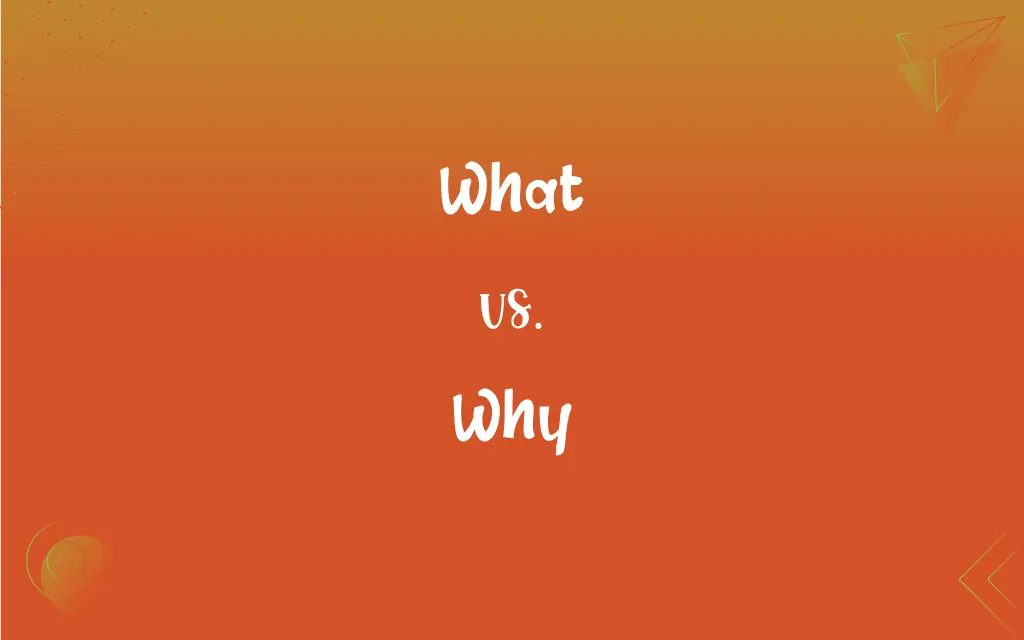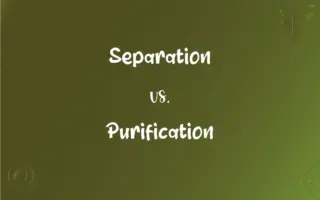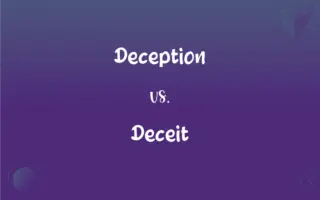What vs. Why: What's the Difference?
Edited by Harlon Moss || By Janet White || Published on December 29, 2023
What is used to ask for information about something, referring to things or activities. Why is used to inquire about the reason or purpose behind something.

Key Differences
What is used to identify or inquire about something, seeking information about its nature, identity, or purpose. It focuses on the object or subject of the question. Why, in contrast, seeks explanations or reasons, delving into the cause or rationale behind an action or situation.
When someone asks what, they seek to understand 'what' is happening, 'what' something is, or 'what' details pertain to the subject. It's about defining, identifying, or describing. Why goes beyond the surface, aiming to understand the underlying reasons or motivations, asking for the cause or justification.
The question what is often the starting point of inquiry, asking for basic information or clarification. It can pertain to facts, definitions, or details of a situation. Why takes the inquiry deeper, probing for understanding, causes, and reasoning, often leading to more complex discussions.
In research or investigation, what often relates to the gathering of facts and data – 'what' is observed, 'what' are the characteristics. Why is more analytical, asking for interpretations or reasons behind those facts and observations.
Usage of what can be in various contexts – asking about objects, actions, or descriptions. It's versatile and foundational in information gathering. Why, while also versatile, is more reflective and analytical, seeking deeper understanding or justification.
ADVERTISEMENT
Comparison Chart
Purpose
To identify, describe, or seek information about something
To inquire about reasons, causes, or motivations
Focus
Facts, identity, nature of subjects or objects
Underlying reasons, explanations, justifications
Inquiry Level
Basic information gathering and clarification
Deeper understanding, analysis, and reasoning
Usage Context
Objects, actions, characteristics
Causes, rationale, motivations
Inquiry Type
Descriptive, factual
Analytical, reflective
ADVERTISEMENT
What and Why Definitions
What
Used to inquire about the identity or nature of something.
What is the capital of France?
Why
Used to ask for reasons or explanations behind actions or events.
Why did you choose this career?
What
Used to request clarification or details about a subject or object.
What are the ingredients in this recipe?
Why
Employed to seek justification or rationale.
Why should we adopt this strategy?
What
A question word asking for specific information or explanation.
What time does the meeting start?
Why
Used to question motives or reasons behind someone's decision.
Why did you move to a new city?
What
Employed to inquire about activities or events.
What are you doing this weekend?
Why
Inquiring about the underlying reason or logic.
Why are whales considered mammals?
What
A word to ask about the type or kind of something.
What kind of music do you like?
Why
A word to inquire about the cause or purpose of something.
Why is the sky blue?
What
Which one or ones of several or many
What college are you attending? You should know what musical that song is from.
Why
For what purpose, reason, or cause; with what intention, justification, or motive
Why is the door shut? Why do birds sing?.
What
Whatever
They soon repaired what damage had been done.
Why
The reason, cause, or purpose for which
I know why you left.
FAQs
Is 'why' always about seeking explanations?
Yes, 'why' is typically used to seek explanations or understand motivations.
Why do we use 'why' in questions?
We use 'why' to inquire about reasons, causes, or justifications behind something.
Can 'what' and 'why' be used interchangeably?
No, they serve different purposes – 'what' for information, 'why' for reasons.
How does 'what' contribute to understanding?
'What' helps in gathering factual information and details, contributing to basic understanding.
Can 'what' be used to clarify misunderstandings?
Yes, 'what' can be used to clarify or seek further details in case of misunderstandings.
In what scenarios is 'why' particularly useful?
'Why' is useful in scenarios requiring analysis, reasoning, or understanding motives.
Why is context important when using 'why'?
Context is important as 'why' can imply a need for justification or understanding of causes.
What is the primary use of 'what'?
'What' is primarily used to ask about the identity, nature, or description of something.
Is 'what' used in defining terms?
Yes, 'what' is often used in defining or describing terms and concepts.
How does 'what' assist in learning?
'What' assists in learning by providing fundamental information and facts.
What types of answers does 'what' elicit?
'What' elicits factual, descriptive, and specific types of answers.
Can 'what' questions lead to discovery?
Yes, 'what' questions can lead to discovery by revealing new information or details.
Why do some people find 'why' questions challenging?
Some find 'why' questions challenging as they require explanation or justification.
How do children use 'what' in learning?
Children use 'what' to identify objects, understand their environment, and learn new concepts.
What role does 'what' play in communication?
In communication, 'what' plays a role in clarifying, informing, and explaining.
Can 'why' lead to philosophical inquiries?
Yes, 'why' can lead to philosophical inquiries by probing into deeper existential reasons.
Can 'why' be seen as a critical thinking question?
Yes, 'why' is often used to encourage critical thinking and deeper analysis.
Why do educators emphasize 'why' questions?
Educators emphasize 'why' questions to develop students' understanding and reasoning skills.
Is 'why' important in problem-solving?
Yes, 'why' is important in problem-solving to understand underlying causes.
Does 'why' imply a deeper level of inquiry?
Yes, 'why' typically implies a deeper level of inquiry into reasons or causes.
About Author
Written by
Janet WhiteJanet White has been an esteemed writer and blogger for Difference Wiki. Holding a Master's degree in Science and Medical Journalism from the prestigious Boston University, she has consistently demonstrated her expertise and passion for her field. When she's not immersed in her work, Janet relishes her time exercising, delving into a good book, and cherishing moments with friends and family.
Edited by
Harlon MossHarlon is a seasoned quality moderator and accomplished content writer for Difference Wiki. An alumnus of the prestigious University of California, he earned his degree in Computer Science. Leveraging his academic background, Harlon brings a meticulous and informed perspective to his work, ensuring content accuracy and excellence.







































































